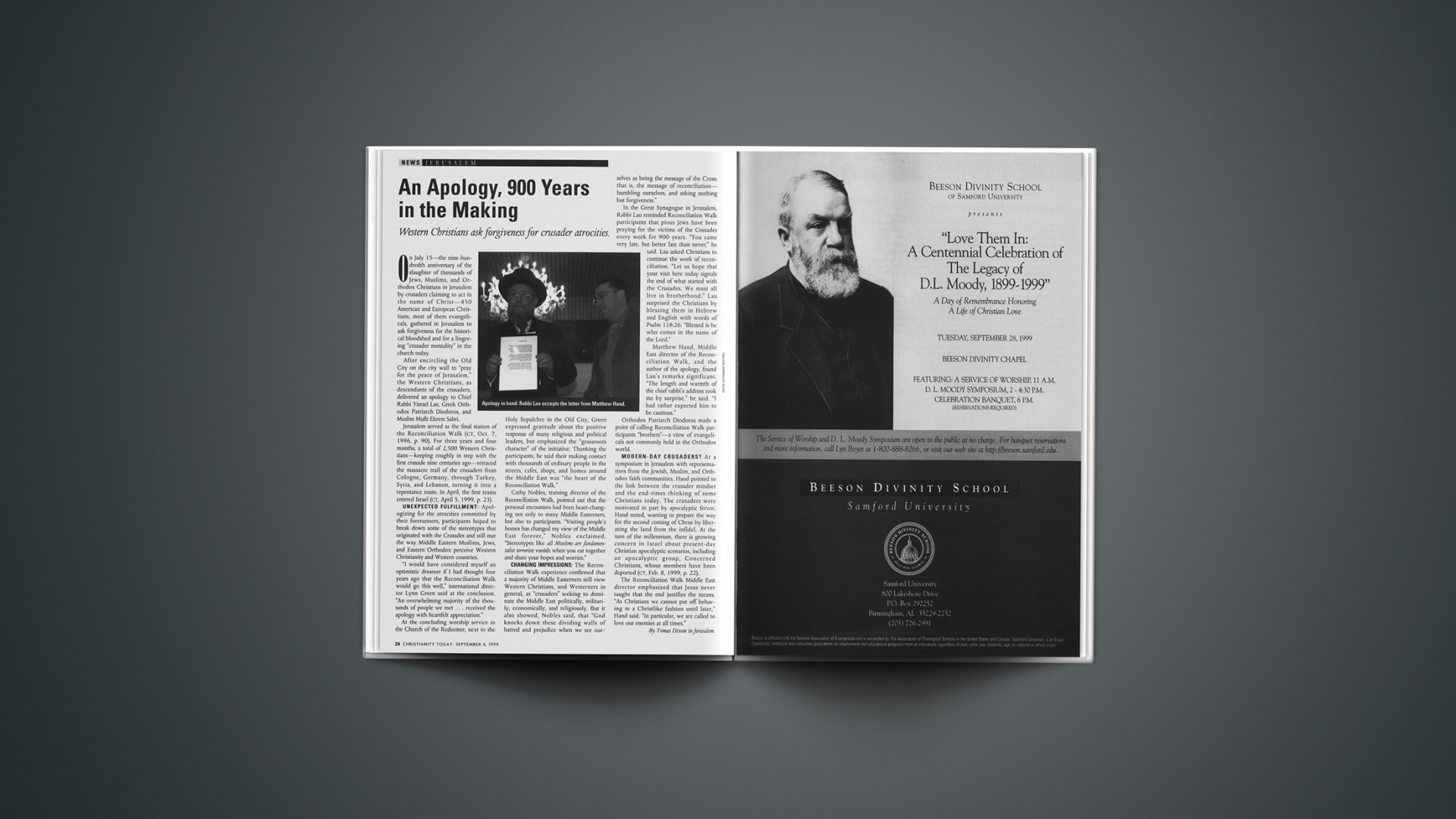On July 15—the nine-hundredth anniversary of the slaughter of thousands of Jews, Muslims, and Orthodox Christians in Jerusalem by crusaders claiming to act in the name of Christ—450 American and European Christians, most of them evangelicals, gathered in Jerusalem to ask forgiveness for the historical bloodshed and for a lingering “crusader mentality” in the church today.
After encircling the Old City on the city wall to “pray for the peace of Jerusalem,” the Western Christians, as descendants of the crusaders, delivered an apology to Chief Rabbi Yisrael Lau, Greek Orthodox Patriarch Diodoros, and Muslim Mufti Ekrem Sabri.
Jerusalem served as the final station of the Reconciliation Walk (CT, Oct. 7, 1996, p. 90). For three years and four months, a total of 2,500 Western Christians—keeping roughly in step with the first crusade nine centuries ago—retraced the massacre trail of the crusaders from Cologne, Germany, through Turkey, Syria, and Lebanon, turning it into a repentance route. In April, the first teams entered Israel (CT, April 5, 1999, p. 23).
UNEXPECTED FULFILLMENT: Apologizing for the atrocities committed by their forerunners, participants hoped to break down some of the stereotypes that originated with the Crusades and still mar the way Middle Eastern Muslims, Jews, and Eastern Orthodox perceive Western Christianity and Western countries.
“I would have considered myself an optimistic dreamer if I had thought four years ago that the Reconciliation Walk would go this well,” international director Lynn Green said at the conclusion. “An overwhelming majority of the thousands of people we met … received the apology with heartfelt appreciation.”
At the concluding worship service in the Church of the Redeemer, next to the Holy Sepulchre in the Old City, Green expressed gratitude about the positive response of many religious and political leaders, but emphasized the “grassroots character” of the initiative. Thanking the participants, he said their making contact with thousands of ordinary people in the streets, cafes, shops, and homes around the Middle East was “the heart of the Reconciliation Walk.”
Cathy Nobles, training director of the Reconciliation Walk, pointed out that the personal encounters had been heart-changing not only to many Middle Easterners, but also to participants. “Visiting people’s homes has changed my view of the Middle East forever,” Nobles ex claimed. “Stereotypes like all Muslims are fundamentalist terrorists vanish when you eat together and share your hopes and worries.”
CHANGING IMPRESSIONS: The Reconciliation Walk experience confirmed that a majority of Middle Easterners still view Western Christians, and Westerners in general, as “crusaders” seeking to dominate the Middle East politically, militarily, economically, and religiously. But it also showed, Nobles said, that “God knocks down these dividing walls of hatred and prejudice when we see ourselves as being the message of the Cross; that is, the message of reconciliation—humbling ourselves, and asking nothing but forgiveness.”
In the Great Synagogue in Jerusalem, Rabbi Lau reminded Reconciliation Walk participants that pious Jews have been praying for the victims of the Crusades every week for 900 years. “You came very late, but better late than never,” he said. Lau asked Christians to continue the work of reconciliation. “Let us hope that your visit here today signals the end of what started with the Crusades. We must all live in brotherhood.” Lau surprised the Christians by blessing them in Hebrew and English with words of Psalm 118:26: “Blessed is he who comes in the name of the Lord.”
Matthew Hand, Middle East director of the Reconciliation Walk, and the author of the apology, found Lau’s remarks significant. “The length and warmth of the chief rabbi’s address took me by surprise,” he said. “I had rather expected him to be cautious.”
Orthodox Patriarch Diodoros made a point of calling Reconciliation Walk participants “brothers”—a view of evangelicals not commonly held in the Orthodox world.
MODERN-DAY CRUSADERS? At a symposium in Jerusalem with representatives from the Jewish, Muslim, and Orthodox faith communities, Hand pointed to the link between the crusader mindset and the end-times thinking of some Christians today. The crusaders were motivated in part by apocalyptic fervor, Hand noted, wanting to prepare the way for the second coming of Christ by liberating the land from the infidel. At the turn of the millennium, there is growing concern in Israel about present-day Christian apocalyptic scenarios, including an apocalyptic group, Concerned Christians, whose members have been deported (CT, Feb. 8, 1999, p. 22).
The Reconciliation Walk Middle East director emphasized that Jesus never taught that the end justifies the means. “As Christians we cannot put off behaving in a Christ like fashion until later,” Hand said. “In particular, we are called to love our enemies at all times.”
Copyright © 1999 Christianity Today. Click for reprint information.










